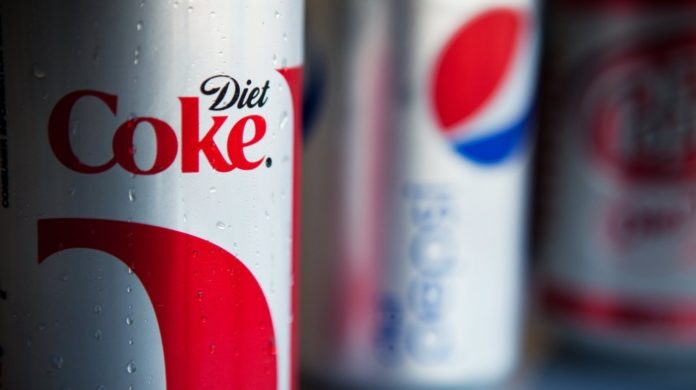
When given the choice between diet soda and regular soda, the calorie-free option may not be the lesser of two evils. A recent study from the Journal of the American Geriatrics Society suggests that diet soda may also lead to more belly fat, especially as you get older.
Researchers looked at data from 749 adults over the age of 65 from the San Antonio Longitudinal Study of Aging. They found that, over the course of almost 10 years, those who drank diet soda daily saw the growth of their waist circumferences more than double that of non-diet soda drinkers.
In the study, diet soda drinkers’ waist circumferences expanded 2.11 centimeters over the 9.4-year period, while non-diet soda drinkers’ waists only expanded 0.77 centimeters. Those who occasionally drank diet soda saw a 1.83 centimeter growth in weight circumference. Surprisingly, the researchers didn’t find any consistent relationship between drinking regular soda and waist circumference. (Though it’s important to point out that this doesn’t mean the relationship does not exist — plenty of previous studies have had no trouble linking sugar-sweetened sodas with weight gain.)
Of course, the concerns associated with increasing abdominal fat extend far beyond vanity. Large waist circumference has been linked to high blood pressure, diabetes, coronary heart disease, albuminuria, depression, cognitive decline, and death from cancer and cardiovascular disease, among other health risks. As you get older, you’re more vulnerable to expanding waistlines and more visceral fat, the type of fat that can lead to greater health consequences since it’s around important abdominal organs like the liver, pancreas and intestines.
The researchers theorized that the weight gain could be for a number of reasons. Previous studies have indicated that artificial sweeteners could be to blame by altering the way the body processes sugar, leading people to be hungrier. A recent study in mice showed that artificial sweeteners actually changed the gut bacteria of mice in ways that made them vulnerable to insulin resistance and glucose intolerance — both of which can lead to weight gain. And other mice research suggests that artificial sweeteners are associated with a drop in the appetite-regulating hormone leptin, which is responsible for inhibiting hunger.
In an interview with Reuters, the study’s lead author, Dr. Sharon Fowler, explained another theory: “I think it probably is true that for some people, if they are not being really hardcore about losing weight and getting a healthier lifestyle, if they switch over to diet soda, that allows them to have an extra slice of pizza or a candy bar.” But that’s not actually an effective weight loss strategy, she said: “Calorie-free does not equal consequence-free.”
Of course, since the study was observational in nature, the researchers were unable to determine whether diet soda consumption caused the observed increases in abdominal fat. It’s possible, for instance, that people may have switched to diet soda because they’d been gaining weight, but then still kept packing on the pounds because of other dietary habits, not the diet sodas.
The healthiest option, say the researchers, is to skip the soda all together — whether it’s diet or regular. Instead, they recommend that you try drinking unsweetened beverages like coffee, tea, mineral water or 100 percent fruit juice. Or better yet, stick to plain, old water.
